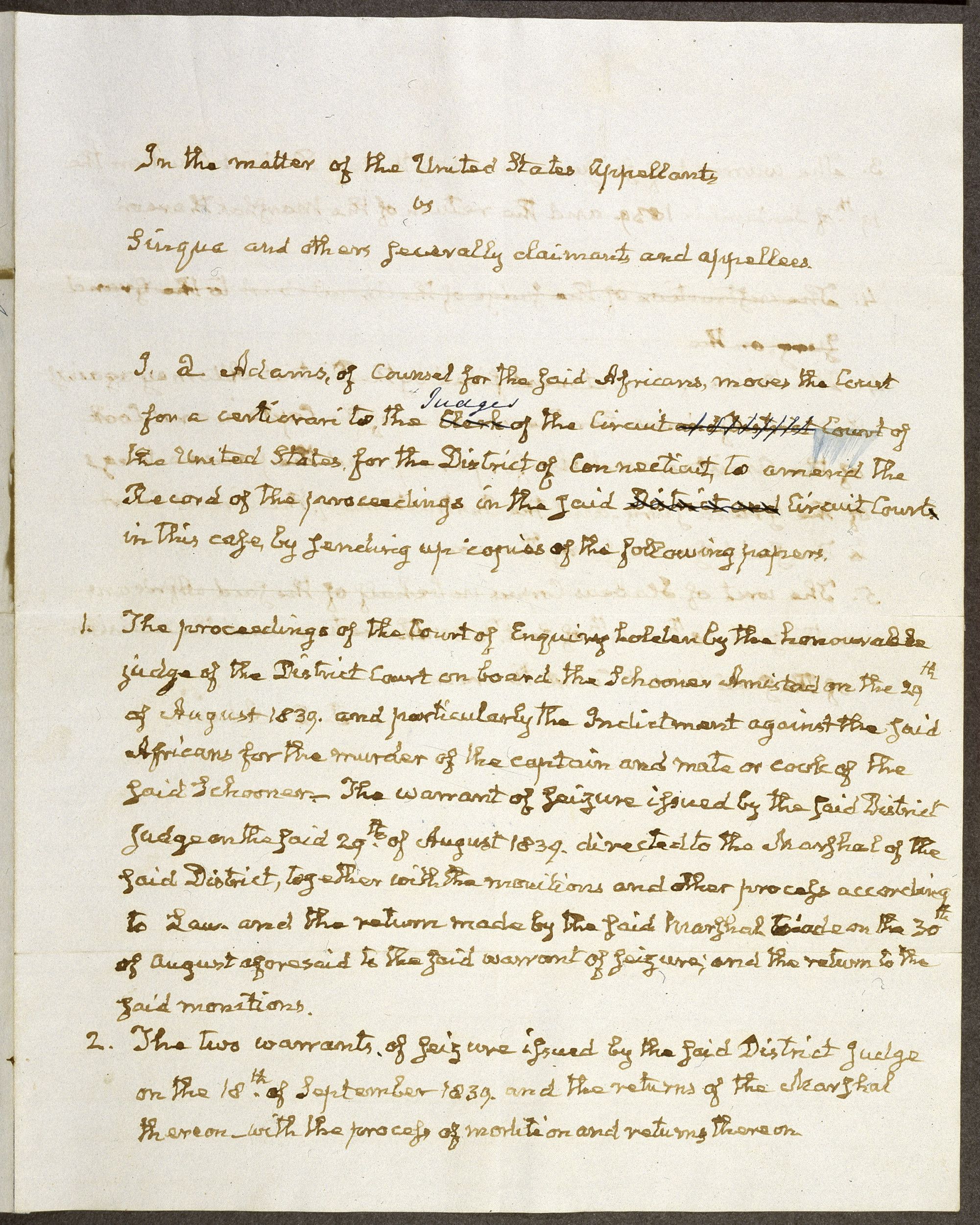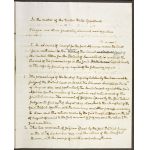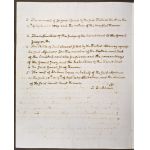John Quincy Adams's Request for Papers Relating to the Lower Court Trials of the Amistad Africans
1841
Add to Favorites:
Add all page(s) of this document to activity:

Add only page 1 to activity:
Add only page 2 to activity:
In February 1839, Portuguese slave hunters abducted a large group of Africans from Sierra Leone and shipped them to Havana, Cuba, a center for the slave trade. This abduction violated all of the treaties then in existence. Two Spanish plantation owners purchased 53 Africans and put them aboard the Cuban schooner Amistad to ship them to a Caribbean plantation. On July 1, 1839, the Africans seized the ship, killed the captain and the cook, and ordered the plantation owners to sail to Africa.
Instead, they sailed north; and on August 24, 1839, the Amistad was seized off Long Island, NY, by the U.S. brig Washington. The schooner, its cargo, and all on board were taken to New London, CT. The plantation owners were freed and the Africans were imprisoned on charges of murder.
The murder charges were dismissed, but the Africans continued to be held in confinement and the case went to trial in the Federal District Court in Connecticut. The plantation owners, government of Spain, and captain of the Washington each claimed rights to the Africans or compensation.
President Van Buren was in favor of extraditing the Africans to Cuba. However, abolitionists in the North opposed extradition and raised money to defend the Africans. Had it not been for the actions of abolitionists in the United States, the issues related to the Amistad might have ended quietly in an admiralty court. But they used the Amistad incident as a way to expose the evils of slavery and generate significant opposition to the practice. They hired attorneys to represent the Africans.
The court ruled that the case fell within Federal jurisdiction and that the claims to the Africans as property were not legitimate because they were illegally held as slaves. The U.S. District Attorney filed an appeal to the Supreme Court.
In the trial before the Supreme Court, the Africans were represented by John Quincy Adams, a former U.S. President and descendant of American revolutionaries. This document is Adams's request for papers from the lower courts one month before the proceedings opened.
In January 1841, for 8 1/2 hours, the 73-year-old Adams passionately and eloquently defended the Africans' right to freedom on both legal and moral grounds, referring to treaties prohibiting the slave trade and to the Declaration of Independence. He defended the right of the accused to fight to regain their freedom.
The Supreme Court decided in favor of the Africans, and 35 of them were returned to their homeland. The others died at sea or in prison while awaiting trial.
Instead, they sailed north; and on August 24, 1839, the Amistad was seized off Long Island, NY, by the U.S. brig Washington. The schooner, its cargo, and all on board were taken to New London, CT. The plantation owners were freed and the Africans were imprisoned on charges of murder.
The murder charges were dismissed, but the Africans continued to be held in confinement and the case went to trial in the Federal District Court in Connecticut. The plantation owners, government of Spain, and captain of the Washington each claimed rights to the Africans or compensation.
President Van Buren was in favor of extraditing the Africans to Cuba. However, abolitionists in the North opposed extradition and raised money to defend the Africans. Had it not been for the actions of abolitionists in the United States, the issues related to the Amistad might have ended quietly in an admiralty court. But they used the Amistad incident as a way to expose the evils of slavery and generate significant opposition to the practice. They hired attorneys to represent the Africans.
The court ruled that the case fell within Federal jurisdiction and that the claims to the Africans as property were not legitimate because they were illegally held as slaves. The U.S. District Attorney filed an appeal to the Supreme Court.
In the trial before the Supreme Court, the Africans were represented by John Quincy Adams, a former U.S. President and descendant of American revolutionaries. This document is Adams's request for papers from the lower courts one month before the proceedings opened.
In January 1841, for 8 1/2 hours, the 73-year-old Adams passionately and eloquently defended the Africans' right to freedom on both legal and moral grounds, referring to treaties prohibiting the slave trade and to the Declaration of Independence. He defended the right of the accused to fight to regain their freedom.
The Supreme Court decided in favor of the Africans, and 35 of them were returned to their homeland. The others died at sea or in prison while awaiting trial.
Transcript
In the matter of the United States Appellantsvs
Sinque and others severally claimants and appellees
J. Q. Adams, of Counsel for the said Africans, moves the Court for a certiorari to the Judges [crossed out: Clerk] of the Circuit [crossed out] Court of the United States, for the District of Connecticut, to amend the Record of the proceedings in the said [crossed out: District and] Circuit Court in this case, by sending us copies of the following papers.
1. The proceedings of the Court of Enquiry holden by the honourable judge of the District Court on board the Schooner Amistad on the 29th of August 1839. and particularly the Indictment against the said Africans for the murder of the captain and mate or cook of the said Schooner. The warrant of Seizure issued by the said District Judge on the said 29th. of August 1839. directed to the Marshal of the said District, together with the monitions and other process according to Law. and the return made by the said Marshal made on the 30th of August aforesaid to the said warrant of Seizure, and the return to the said monitions.
2. The two warrants of Seizure issued by the said District Judge on the 18th. of September 1839. and the returns of the Marshal thereon – with the process of monition and returns thereon.
3. The warrant of Seizure issued by the said District Court on the 19th. of September 1839. and the return of the Marshal thereon.
4. [crossed out]
4. The Bills of Indictment filed by the District Attorney against the paid Africans for the murder of the Captain and Cook of the Amistad, and also for piracy: and the proceedings of the Grand Jury and the Instructions of the Circuit Court to the said Grand Jury thereon.
5. The writ of Habeas Corpus in behalf of the said Africans on the said 18th. or 19th. of Septr. 1839: the return, and the decision of the said Circuit Court thereon
J. Q. Adams.
This primary source comes from the Records of the Supreme Court of the United States.
National Archives Identifier: 301671
Full Citation: John Quincy Adams's Request for Papers Relating to the Lower Court Trials of the Amistad Africans [Petition for Certioriari]; 1841; United States, Appellants, v. The Libellants and Claimants of the Schooner Amistad, her tackle, apparel and furniture, together with her cargo, and the Africans mentioned and described in the several libels and claims, Appellees; Appellate Jurisdiction Case Files, 1792 - 2014; Records of the Supreme Court of the United States, Record Group 267; National Archives Building, Washington, DC. [Online Version, https://docsteach.org/documents/document/adams-amistad-request, April 25, 2024]Rights: Public Domain, Free of Known Copyright Restrictions. Learn more on our privacy and legal page.





